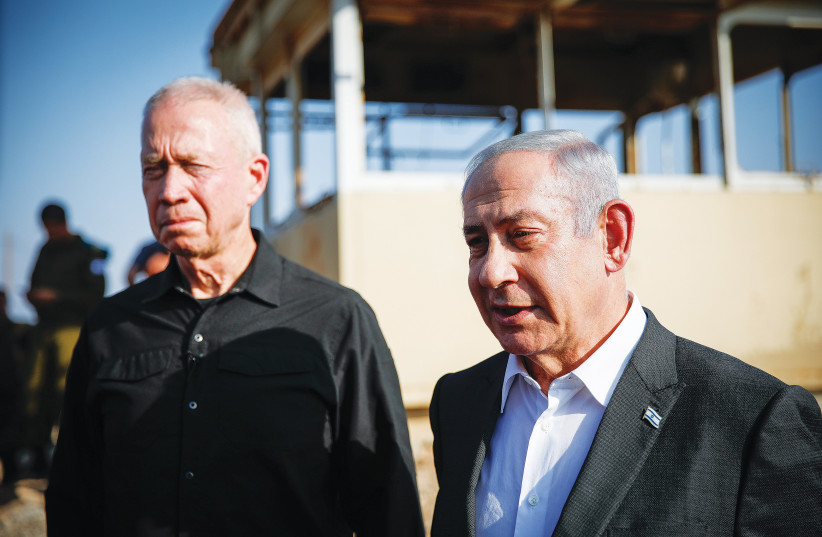A battle of titans is taking place that could determine the fate of the nation.
It is not a “clean” battle of one side versus another, but rather, a highly complex four-dimensional war where each actor is playing multiple sides over framing the IDF reservist protests against the judicial overhaul.
Prime Minister Benjamin Netanyahu did not see the protests coming. The mix of the protests and of Defense Minister Yoav Gallant publicly demanding in March that he halt the legislation caught him off guard and led to a tactical retreat that lasted until late July.
But Netanyahu laid sturdier groundwork for his judicial overhaul in round two.
First, he watered down and delayed the legislation, moving ahead with the least significant of four major initiatives first, dropping two major ones, and holding the most important off until the October-November period.

Netanyahu convinced Gallant that the watered-down version of the legislation, plus the time he gave the opposition to negotiate compromises, was enough to move forward unilaterally on repealing the reasonableness standard.
When Gallant started to attack reservists who were quitting, IDF Chief of Staff Lt.-Gen. Herzi Halevi followed suit. From April until June, the tone shifted; it almost sounded like Gallant and Halevi were in lockstep with Netanyahu.
Halevi even told some in his inner circle that he felt some of the reservists “played” him and another top official during the first wave of threats, and that they really did show up in the end.
At some point during this time period, former top security chiefs and officials, decades-long friends and comrades of Halevi and of Shin Bet Director Ronen Bar and Mossad Director David Barnea, joined in on the attacks.
They said they understood that the current chiefs were not allowed to go against government policy in general, but they argued that the oath all security officials swear is ultimately to Israel and its citizens, not to a specific government.
They said if Netanyahu’s policies led to a point where the IDF would not be ready for war, Halevi and the other chiefs would have to somehow get Netanyahu to stop the legislation.
Up until the repeal passed, Gallant believed that Netanyahu would unilaterally soften it as a nod to the threatening reservists and to signal that even if some changes were being made that they did not like, their worst fears of destroying the judicial branch’s independence would not come to pass.
But Netanyahu refused to water down the repeal of the reasonableness standard. He continued to loudly trumpet altering the appointment of judges around October-November – instead of agreeing to another year of negotiations with the opposition. This led Gallant, Halevi, and the other security chiefs to shift their position again.
And suddenly, the reservists were not bluffing. More than 700 IAF reservists, including those in key positions, stopped showing up, along with around 10,000 other reservists.
Halevi and the other security chiefs would campaign hard to convince the reservists not to quit, with the core argument being that the Hezbollah threat was too great and did not care about Israel’s judiciary.
This argument held – until it didn’t, when the Knesset voted to cancel the reasonableness standard.
Once Halevi could see the IDF’s readiness was taking a major hit, he could not remain silent. He made up his mind that he would not exaggerate some of the IDF readiness issues like some of his “formers” friends were doing, but once the IDF’s readiness really took a hit, his stance would be loud and clear.
This meant that in July, the “formers” and reservist protesters were saying the IDF had lost its war readiness, while Halevi and the other current chiefs called this an exaggeration.
When the IDF starts to cross the line
But as of this past weekend, certain lines were indeed crossed in terms of IDF readiness – something that Halevi made very clear, enraging Netanyahu, who viewed any departure from his political narrative as a betrayal.
Meanwhile, Gallant has been helping Halevi make his case behind the scenes, but he has not yet gone head-to-head with Netanyahu, as he did in March.
One of the biggest uncertainties is whether Gallant will again give Netanyahu an ultimatum, or whether he was so scarred by what happened in March that he will stick to the line that whatever the government passes, it is better that he remain defense minister instead of another Likud figure with less sympathy toward the security chiefs.
This means that Gallant is currently pressuring both sides: Halevi to alternately heed Netanyahu or go up against him on his behalf; and the prime minister, who should be worried about a state commission of inquiry into how he left the country vulnerable to attack.
It also means that both sides of the political spectrum remain frustrated with both Gallant and Halevi (and the other current security chiefs) for not taking a clearer stance.
One day soon, the Likud or the protesting reservists might attack or defend Halevi, and it will all depend on whether the issue at hand is opposing reservists quitting internally, or publicly discussing the reduced readiness of the IDF.
Netanyahu might also shift at some point, which would reshuffle the cards altogether.
Under normal circumstances, Halevi’s announcement last week of his new multiyear signature budget plan and strategy for handling Iran, Hezbollah, Hamas, and others would have been in the headlines everywhere.
But in the current four-dimensional crisis, no one even knows what kind of army there will be in September and how each major actor will maneuver, let alone think about a multiyear plan.
